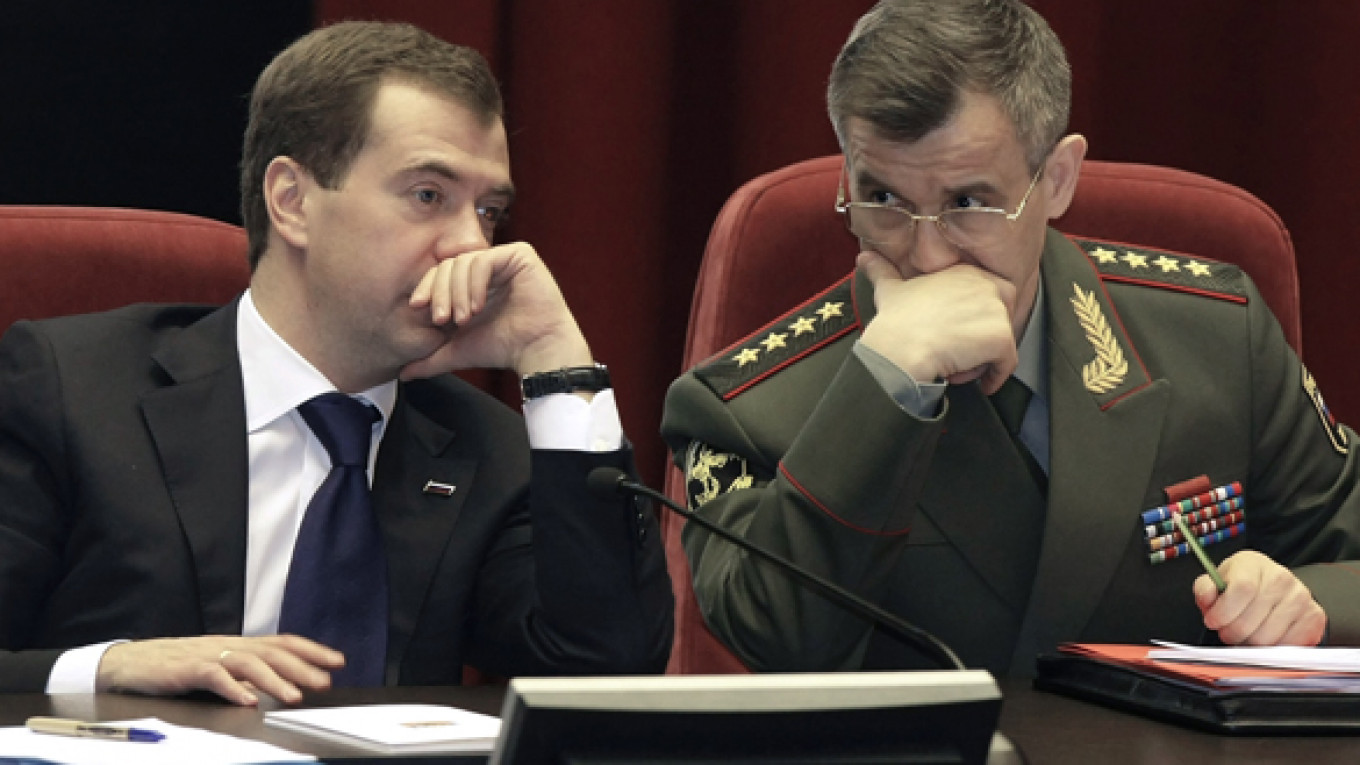President Dmitry Medvedev on Thursday pressed ahead with a drive for reforms in the scandal-plagued Interior Ministry, ordering sweeping personnel cuts in the ministry's massive bureaucracy and promising harsh punishment for police who break the law.
At a meeting with top Interior Ministry officials, Medvedev said he had ordered the number of personnel at the ministry's head office to be halved to about 10,000. He also dismissed two deputy interior ministers and 16 senior police officials.
Medvedev vowed to take personal control of the reforms and said wave of violent crimes committed by police officers over the past year had "eroded" the authority of police.
"A series of incidents have caused a strong public reaction, eroding the authority of the Interior Ministry and its personnel," Medvedev said. "The responsibility of Interior Ministry personnel on all levels will be strengthened."
He said he had given Interior Minister Rashid Nurgaliyev one month to formulate measures to combat police abuses and attract better recruits to the police force.
Critics have dismissed previous attempts to implement police reforms as half-hearted and superficial, but the personnel cuts announced by Medvedev on Thursday were far from minor. He fired two of Nurgaliyev's deputies — Nikolai Ovchinnikov and Arkady Yevdeleyev — and replaced them with senior members of the presidential administration: Sergei Gerasimov and Sergei Bulavin.
The move indicates that Medvedev may be trying to install his own people in key positions in law enforcement agencies. Bulavin is a former police general, while Gerasimov worked as a deputy prosecutor general before joining the presidential administration.
Medvedev also sacked the top police officials in eight regions and replaced them with new appointees.
Former police general Alexei Volkov, a State Duma deputy with the ruling United Russia party, told The Moscow Times on Thursday that the political will exists to carry out substantive reforms. "There is an … understanding that doing nothing is not an option," said Volkov, deputy head of the Duma's security committee who attended Thursday's meeting with Medvedev.
A poll released by the respected Levada Center this week showed that more than two-thirds of Russians do not trust police.
A supermarket shooting rampage last year by Moscow police major Denis Yevsukov, who killed two and injured seven, has become the most egregious example of police abuse over the last year. But reports of police harassment, violence and corruption are routine.
Medvedev told Thursday's meeting that authorities had opened about 15,000 criminal cases involving corruption, but that the figure was "just the tip of the iceberg."
Nurgaliyev, meanwhile, told Thursday's meeting that police officers themselves are increasingly being threatened with violence and blackmail by civilians. The ministry's internal affairs department received more than 1,000 complaints from police officers last year involving purported crimes committed against them by citizens, Nurgaliyev said.
Experts and police officers themselves say meager police salaries breed corruption, and Medvedev on Thursday said salaries would be boosted for police officers, who earn on average anywhere between $300 and $660, depending on their region. As part of the reforms, the Interior Ministry will also transfer the country's network of drunk tanks to the Health and Social Development Ministry. Established during Soviet times, drunk tanks faced increased scrutiny in recent months after a Russian journalist in a Tomsk drunk tank was beaten to death by a police officer on duty.
A Message from The Moscow Times:
Dear readers,
We are facing unprecedented challenges. Russia's Prosecutor General's Office has designated The Moscow Times as an "undesirable" organization, criminalizing our work and putting our staff at risk of prosecution. This follows our earlier unjust labeling as a "foreign agent."
These actions are direct attempts to silence independent journalism in Russia. The authorities claim our work "discredits the decisions of the Russian leadership." We see things differently: we strive to provide accurate, unbiased reporting on Russia.
We, the journalists of The Moscow Times, refuse to be silenced. But to continue our work, we need your help.
Your support, no matter how small, makes a world of difference. If you can, please support us monthly starting from just $2. It's quick to set up, and every contribution makes a significant impact.
By supporting The Moscow Times, you're defending open, independent journalism in the face of repression. Thank you for standing with us.
Remind me later.


